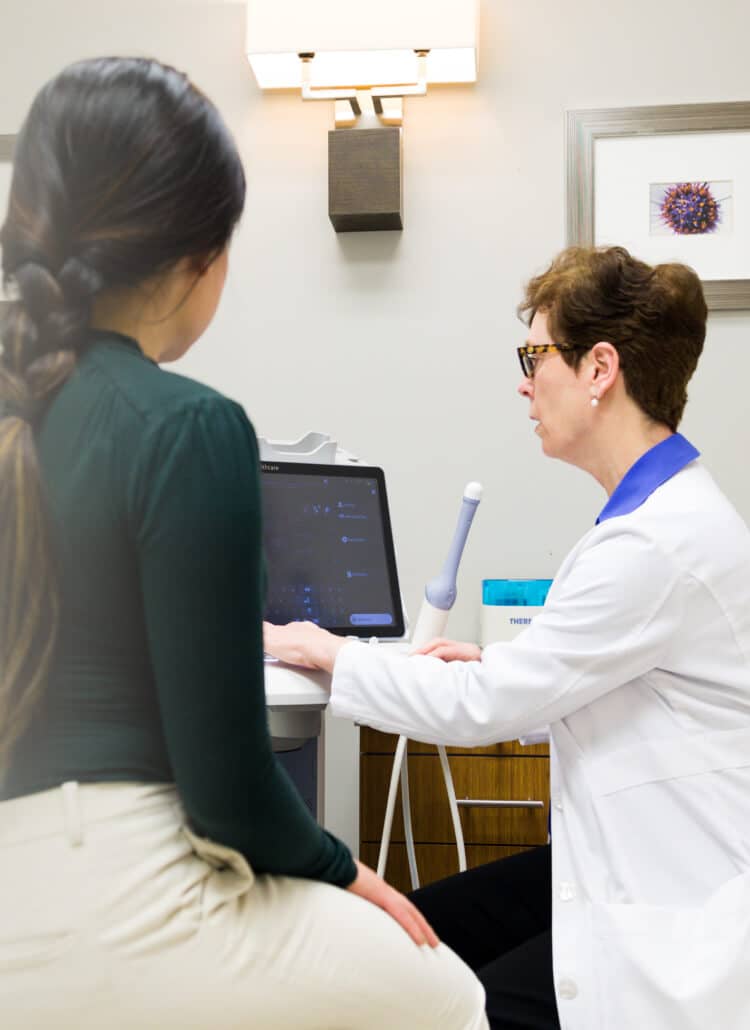Occurring in up to 10 percent of reproductive age women, polycystic ovarian syndrome (PCOS) is a frequently diagnosed disorder of the endocrine system – that part of the body responsible for producing and balancing hormones. With PCOS, women produce a high level of androgens or male hormones (women normally make male hormones, but at a lower level). This hormonal imbalance interferes with regular ovulation and also results in the presence of multiple non-maturing follicular cysts in the ovaries, hence the name. Additional symptoms of PCOS may include excess facial or body hair and acne as well as obesity. The physical symptoms of PCOS are highly variable and ethnicity affects the presence or absence of symptoms. Sometimes, lack of regular menstrual periods is the only symptom. PCOS is often characterized by insulin resistance, which can lead to long term problems like heart disease, diabetes and high cholesterol. While there is no cure for PCOS, its symptoms can be addressed and managed, enabling women with this condition to have successful pregnancies and long-term good health.
Diagnosing PCOS
Physical examination, health history and blood testing can help a doctor to diagnose this PCOS.
A diagnosis will include:
- Health history to determine frequency and regularity of ovulation
- Blood testing to measure hormone levels
- Ultrasound to view ovaries (polycystic ovaries will appear to be enlarged with multiple small (antral) follicles)
- Physical exam to assess characteristics including male pattern hair growth, acne and excessive weight gain
Treating PCOS
For women desiring immediate conception, the first line of therapy would be oral medications such as clomiphene or letrozole. If the patient does not respond to these medications, in some cases, the patient will be treated with injectable fertility medications. Ultrasound monitoring is performed while taking these medications to ensure a response is occurring. If there is significant evidence of insulin resistance, the RE may recommend a medication such as metformin (Glucophage) be used in conjunction with the fertility medications. Metformin is a drug used to treat diabetes and helps patients become more sensitive to insulin, which often makes the ovaries in PCOS more responsive to ovulation induction.
In some cases of severe polycystic ovarian syndrome, it may be very difficult to induce only one or two follicles to develop with either oral or injectable medications. In these cases, we usually have to perform IVF and remove multiple mature eggs from multiple recruited follicles. Pregnancy rates are very good with this option and patients usually have a number of extra embryos to freeze for possible future pregnancies as well.
At our Northern California San Francisco Bay Area clinic, PFC's fertility doctors specialize in helping patients with PCOS. We employ a multi-faced treatment approach and work together to create a personalized plan for each patient.
Would you like to learn more about PCOS and fertility? Join us for our next free fertility seminar!
We invite you to meet the nationally recognized 'Top Docs' of Pacific Fertility Center® at our next educational seminar. The seminars are held at our San Francisco Bay Area fertility clinic and provide patients with the opportunity to ask questions about polycystic ovarian syndrome (PCOS) and other fertility concerns.
Some common PCOS questions include:
- How do you diagnose PCOS?
- What pregnancy risks are involved with PCOS?
- I have many choices in Northern California's San Francisco Bay Area. Why should I choose PFC?
- And much more... We're here to answer your questions.
Pacific Fertility Center is located near Fisherman's Wharf and the Embarcadero in Northern California's San Francisco Bay Area. Sign Up for the next new patient seminar @PFC »



